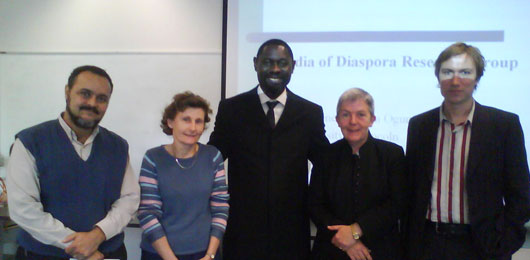
Scholars in the Lincoln School of Journalism have set up a new research group – Media of Diaspora Research Group (MDRG) – to study the interrelationship between the immigrant populations and the media in Lincolnshire.
The MDGR a network of academics and professionals providing public services to the immigrant communities. This enables the researchers to study how migrant communities in Lincolnshire represent themselves in the media, such as on Siren FM. The group is seeking, “academics as well as non-academics to join in taking this research idea forward through discussions, research… workshops and conferences”, he said.
Subsequently, the aim of the group is to build bridges between different nationalities to stop misunderstandings from occurring which can lead to racial tensions. The recent MDRG meeting found that many public sectors working with immigrant communities rarely share information and expertise. Therefore, the MDRG intends to bridge this gap by setting up a one-stop resource portal for collating materials generated by the public sectors which are not in general circulation at the moment.
Some of the participating partners in the MDRG include HM Prison, Siren FM, Anglican Church etc. According to Julie Gale, Governor of HM Prison, Morton Hall, “the prison has a large mix of women from 50 nationalities and meeting their cultural needs is a challenge. There have been instances of tensions and misunderstandings, so it is important that research work is done to foster peaceful co-existence and understanding”.
Another member of the group, Peta Hill, a Community Development Worker in Lincolnshire for the Anglican Church, points out that there is no central point for making the outcome of the independent work done within the migrant communities in the county available to the public. “The reason for some people coming to England to live and work is solely about survival”, she said.
Other individuals and organisations are already working throughout the county to provide social cohesion amongst indigenous and migrant communities. According to David de Verney, the ‘new migrant’s chaplain’ in Lincolnshire for the past few years, who has seen first-hand the difficulties faced by migrant workers moving into the area, “from a purely economic point of view, I find it extremely stupid to treat migrant workers badly and want them to go. They do all the jobs nobody else here wants to do frankly and they do it with good grace and how do we thank them?”
Voice PL, the Lincs Polish Association (LPA), is another organisation that is working towards a better relationship between migrant workers and Lincolnshire residents. It aims to work with a number of communities and organisations in Lincoln to open a community centre which will eventually provide an advice centre, plus a coffee shop and a crèche for city shoppers to drop their children off at for a few hours.
By Gillian Sennet
